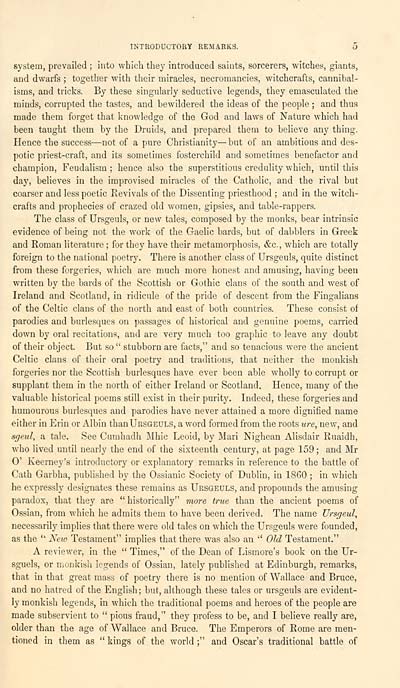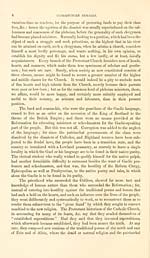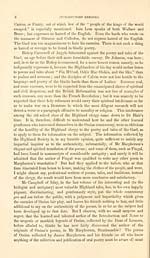Download files
Complete book:
Individual page:
Thumbnail gallery: Grid view | List view

TNTRODUCTOKY REMARKS.
system, prevailed ; into which they introduced saints, sorcerers, witches, giants,
and dwarfs ; together with their miracles, necromancies, witchcrafts, cannibal-
isms, and tricks. By these singularly seductive legends, they emasculated the
minds, corrupted the tastes, and bewildered the ideas of the people ; and thus
made them forget that knowledge of the God and laws of Nature which had
been taught them by the Druids, and prepared them to believe any thing.
Hence the success — not of a pure Christianity— but of an ambitious and des-
potic priest-craft, and its sometimes fo.sterchild and sometimes benefactor and
champion, Feudalism ; hence also the superstitious credulity which, until this
day, believes in the improvised miracles of the Catholic, and the rival but
coarser and less poetic Revivals of the Dissenting priesthood ; and in the witch-
crafts and prophecies of crazed old women, gipsies, and table-rappers.
The class of Ursgeuls, or new tales, composed by the monks, bear intrinsic
evidence of being not the work of the Gaelic bards, but of dabblers in Greek
and Roman literature ; for they have their metamorphosis, &c., which are totally
foreign to the national poetry. There is another class of Ursgeuls, quite distinct
from these forgeries, which are much more honest and amusing, having been
w-ritten by the bards of the Scottish or Gothic clans of the south and west of
Ireland and Scotland, in ridicule of the pride of descent from the Fingalians
of the Celtic clans of the north and east of both countries. These consist of
parodies and burlesques on passages of historical and genuine poems, carried
down by oral recitations, and are very much too graphic to leave any doubt
of their object. But so " stubborn are facts," and so tenacious were the ancient
Celtic clans of their oral poetry and traditions, that neither the monkish
forgeries nor the Scottish burlesques have ever been able wholly to corrupt or
supplant them in the north of either Ireland or Scotland. Hence, many of the
valuable historical poems still exist in their purity. Indeed, these forgeries and
humourous burle.sques and parodies have never attained a more dignified name
either in Erin or Albin than Ursgeuls, a word formed from the roots ure, new, and
sgeul, a tale. See Cumhadh Mhic Leoid, by Mari Nighean Alisdair Ruaidh,
wdio lived until nearly the end of the sixteenth century, at page 159; and Mr
0' Keerney's introductory or explanatory remarks in reference to the battle of
Cath Garbha, published by the Ossianic Society of Dublin, in 1860 ; in which
he expressly designates these remains as Ursgeuls, and propounds the amusing
paradox, that they are " historically" more true than the ancient poems of
Ossian, from which he admits them to have been derived. The name Ursgeul,
necessarily implies that there were old tales on which the Ursgeuls were founded,
as the " New Testament" implies that there was also an " Old Testament."
A reviewer, in the " Times," of the Dean of Lismore's book on the Ur-
sguels, or monkish legends of Ossian, lately published at Edinburgh, remarks,
that in that great mass of poetry there is no mention of Wallace and Bruce,
and no hatred of the English; but, although these tales or ursgeuls are evident-
ly monkish legends, in which the traditional poems and heroes of the people are
made subservient to " pious fraud," they profess to be, and I believe really are,
older than the age of Wallace and Bruce. The Emperors of Rome are men-
tioned in them as " kings of the world ;" and Oscar's traditional battle of
system, prevailed ; into which they introduced saints, sorcerers, witches, giants,
and dwarfs ; together with their miracles, necromancies, witchcrafts, cannibal-
isms, and tricks. By these singularly seductive legends, they emasculated the
minds, corrupted the tastes, and bewildered the ideas of the people ; and thus
made them forget that knowledge of the God and laws of Nature which had
been taught them by the Druids, and prepared them to believe any thing.
Hence the success — not of a pure Christianity— but of an ambitious and des-
potic priest-craft, and its sometimes fo.sterchild and sometimes benefactor and
champion, Feudalism ; hence also the superstitious credulity which, until this
day, believes in the improvised miracles of the Catholic, and the rival but
coarser and less poetic Revivals of the Dissenting priesthood ; and in the witch-
crafts and prophecies of crazed old women, gipsies, and table-rappers.
The class of Ursgeuls, or new tales, composed by the monks, bear intrinsic
evidence of being not the work of the Gaelic bards, but of dabblers in Greek
and Roman literature ; for they have their metamorphosis, &c., which are totally
foreign to the national poetry. There is another class of Ursgeuls, quite distinct
from these forgeries, which are much more honest and amusing, having been
w-ritten by the bards of the Scottish or Gothic clans of the south and west of
Ireland and Scotland, in ridicule of the pride of descent from the Fingalians
of the Celtic clans of the north and east of both countries. These consist of
parodies and burlesques on passages of historical and genuine poems, carried
down by oral recitations, and are very much too graphic to leave any doubt
of their object. But so " stubborn are facts," and so tenacious were the ancient
Celtic clans of their oral poetry and traditions, that neither the monkish
forgeries nor the Scottish burlesques have ever been able wholly to corrupt or
supplant them in the north of either Ireland or Scotland. Hence, many of the
valuable historical poems still exist in their purity. Indeed, these forgeries and
humourous burle.sques and parodies have never attained a more dignified name
either in Erin or Albin than Ursgeuls, a word formed from the roots ure, new, and
sgeul, a tale. See Cumhadh Mhic Leoid, by Mari Nighean Alisdair Ruaidh,
wdio lived until nearly the end of the sixteenth century, at page 159; and Mr
0' Keerney's introductory or explanatory remarks in reference to the battle of
Cath Garbha, published by the Ossianic Society of Dublin, in 1860 ; in which
he expressly designates these remains as Ursgeuls, and propounds the amusing
paradox, that they are " historically" more true than the ancient poems of
Ossian, from which he admits them to have been derived. The name Ursgeul,
necessarily implies that there were old tales on which the Ursgeuls were founded,
as the " New Testament" implies that there was also an " Old Testament."
A reviewer, in the " Times," of the Dean of Lismore's book on the Ur-
sguels, or monkish legends of Ossian, lately published at Edinburgh, remarks,
that in that great mass of poetry there is no mention of Wallace and Bruce,
and no hatred of the English; but, although these tales or ursgeuls are evident-
ly monkish legends, in which the traditional poems and heroes of the people are
made subservient to " pious fraud," they profess to be, and I believe really are,
older than the age of Wallace and Bruce. The Emperors of Rome are men-
tioned in them as " kings of the world ;" and Oscar's traditional battle of
Set display mode to: Large image | Transcription
Images and transcriptions on this page, including medium image downloads, may be used under the Creative Commons Attribution 4.0 International Licence unless otherwise stated. ![]()
| Early Gaelic Book Collections > Blair Collection > Treatise on the language, poetry, and music of the Highland clans > (17) |
|---|
| Permanent URL | https://digital.nls.uk/76236590 |
|---|
| Description | A selection of books from a collection of more than 500 titles, mostly on religious and literary topics. Also includes some material dealing with other Celtic languages and societies. Collection created towards the end of the 19th century by Lady Evelyn Stewart Murray. |
|---|
| Description | Selected items from five 'Special and Named Printed Collections'. Includes books in Gaelic and other Celtic languages, works about the Gaels, their languages, literature, culture and history. |
|---|

